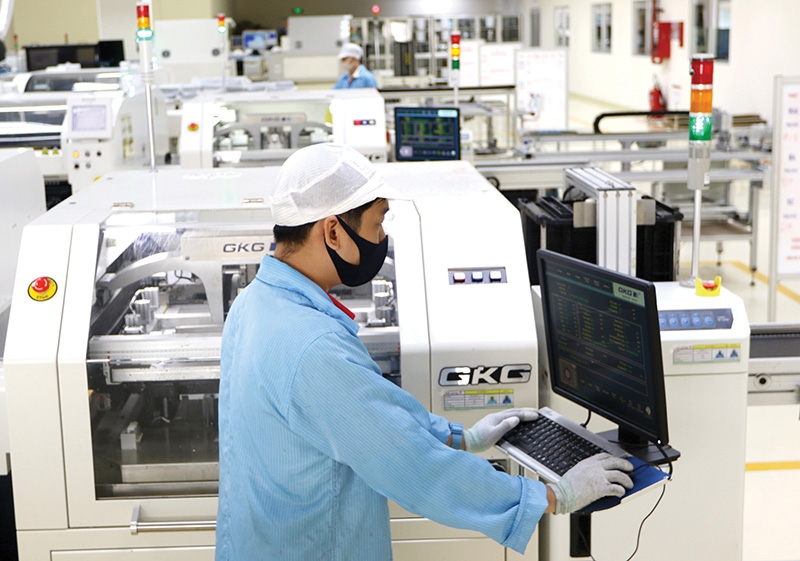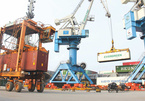 |
| Vietnam, and indeed other nations of similar standing, can use the current climate to push their development ahead, Photo: Le Toan |
Leaders of the EU a fortnight ago held their first bilateral summit since the coronavirus pandemic began to spread – and the addition of Japan as a partner highlighted a potential change in the order of the world.
In a summit first, Japanese Prime Minister Abe Shinzo, European Council President Charles Michel, and European Commission President Ursula von der Leyen said they are continuing major efforts to halt COVID-19, but insisted that an effective multiparty approach is key in the fight.
The leaders recognised that “global solidarity, co-operation, and effective multilateralism are required more than ever to defeat the virus as well as to ensure economic recovery,” they wrote in a joint statement released after the conference.
The online event was part of the bloc’s attempts to work with like-minded nations and regions in the face of an increasingly complex atmosphere in both Washington and Beijing, according to the Financial Times. It kicked off an intense few days of geopolitics for the EU, as foreign ministers prepared to meet with China several days later.
However, last Thursday it was revealed that an autumn summit between the EU and China had been postponed due to the pandemic. German Chancellor Angela Merkel was planning to host EU leaders and Chinese President Xi Jinping in Leipzig on September 14 to enhance political and economic ties between the 27-member bloc and Beijing.
“We need a more robust strategy for China, which also requires better relations with the rest of Asia,” Josep Borrell, the EU’s foreign policy chief, told an annual conference in Berlin last Monday. “That’s why we must invest more in working with India, Japan, South Korea, and others.”
The EU and Japan in last September signed an ambitious deal to build infrastructure and set new development standards in joint ventures worldwide, in a response of sorts to China’s Belt and Road Initiative. PM Abe called growing co-operation between Brussels and Tokyo a “resounding declaration”.
News of nations wishing to get involved in major infrastructure projects could be music to Vietnam’s ears. The country’s ambitious funding into infrastructure will ensure it retains an advantage over regional peers such as India, Bangladesh, and Cambodia, and spurring further construction activity in the coming years, according to Fitch Solutions.
Before the pandemic hit, Vietnam was already well on its way in terms of attracting international investment. A number of industrial parks established across the country have attracted a great deal of attention, with a variety of tax incentives, lower operating costs, and access to nearby roads and ports. Major projects like the North-South Expressway are also being created in order to ease the flow of goods around the country.
Fitch added that the US-China trade war last year prompted low-end electronics and textile manufacturers to move operations from China to Vietnam. It believed the coronavirus pandemic will only lead to further shifting of production lines away from China, with Vietnam likely to benefit.
This has already been demonstrated in Samsung’s recent move to build a research and development centre in Hanoi, as well as the bases being set up by electronics groups such as Denmark’s Sonion and Japan’s Sharp. Other big companies are planning to set up production lines in the country including Microsoft, Nintendo, Ricoh, and Dell.
Meanwhile, strong economic growth over the years has led to rising income levels, which in turn has resulted in an increase in the demand for higher-end residential real estate, especially in dense urban areas such as Hanoi and Ho Chi Minh City.
Push-and-pull effects
While the impact of the COVID-19 pandemic on the global economy is more dramatic than any other shock in recent history, forcing companies big and small to think outside the box and make huge alterations, the consequences of the virus in a shift in geopolitical order could be even more game-changing.
Thitinan Pongsudhirak, an associate professor and director of the Institute of Security and International Studies at Chulalongkorn University in Bangkok, told the Bangkok Post last month that neither the US nor China will come out of the pandemic with flying colours.
“However, the issue will not be about who wins or loses outright. It is likely to be about who suffers least, recovers better, and re-emerges sooner,” he said. “As the global contraction begins to bite all economies, China’s giant market at home will likely give the country more room to manoeuvre.”
Pongsudhirak added that if the weaknesses of the US and Europe in the global financial crisis a decade ago enabled China’s launch to superpower status, the next year could see its solidification. “Even though it will likely register its lowest growth in recent memory, China may well come out of COVID-19 stronger,” he said.
However, Deepanshu Mohan, associate professor of economics and director of the Centre for New Economics Studies at the Jindal School of International Affairs in India noted, “In a post-COVID world, many developed nations may consider disentangling direct trade relations with China and decoupling supply chains to restrict the flow of goods and services into and from China.”
In a recent paper for the SSANSE Commission for a Post-COVID Future at the University of Canterbury in New Zealand, Robert G. Patman explained, “The emerging global order could be characterised by de-globalisation and protectionism and by intensified geopolitical competition involving the great powers like the US and China, and also conflicts such as the relatively brief oil price war between Saudi Arabia and Russia.”
“On the other hand, there are observers who see globalisation as a structural change powered by technologies that have made the world more interconnected,” Patman said.
The data decider
That control of advanced technologies and the data it can provide is set to be a pivotal factor in who can move ahead in the near future. “Technology and data are now inherently geopolitical. The nature of it has placed tech giants such as Google, Facebook, and Amazon in a commanding position,” said Gulshan Rai, former national cybersecurity co-ordinator at the prime minister’s office in India.
“At one time, these tech giants needed the support of governments everywhere. But now with their global reach, it is governments that are dependent on them.”
Rai added that the ongoing pandemic is an example of how citizens around the world have accepted the idea of their live locations being traced and shared. “In India, without much concern for the right to privacy, more than 90 million people have downloaded Aarogya Setu, a contact-tracing app. The pandemic has brought a change in perception on issues like privacy.”
The geopolitical ramifications can be found everywhere. From Southeast Asia to the US, countries are both attempting to recover from the pandemic, and jockey for position on the global stage. With that, old frictions could bubble to the surface.
Karin von Hippel, director-general of the Royal United Services Institute said, “Some countries will emerge from this trying to cling to China, but others are likely to try to decouple.”
For Britain, Germany, France, and other major European economies reliant on the American security umbrella but looking to retain stronger economic ties with China, the difficulty of managing the fallout from the US-China trade (and now coronavirus) dispute may now only increase.
In the United Kingdom, government sources told The Atlantic they are concerned about the reality of a COVID-19 geopolitical second wave. The British government expects protectionism to increase, supply chains to be brought back under national control, and the US-China relationship to become more antagonistic.
This becomes more complex as the UK last week resumed post-Brexit trade discussions with the EU, with much to untangle leading into the official split next year.
Vietnam will be watching, as it weighs up the potential of a future UK-Vietnam free trade deal.
Without reforms in the liberal economic order, and to institutions such as the UN Security Council when it comes to veto powers, the rules-based international order could remain susceptible to the forces of populism. Patman at the University of Canterbury offered a suggestion.
“To meet this challenge, small and middle-level states will have to move from top-down multilateralism – where superpowers like America or China always lead – to a more bottom-up, strategic form of multilateralism that is capable of mobilising international support for long-overdue institutional reforms.”
“Above all, COVID-19 has demonstrated for many states that neither the US or China can be relied upon to protect their vital interests,” Patman said. VIR
Quang Bao

Coronavirus 'a devastating blow for world economy'
World Bank President David Malpass says billions of people will have their livelihoods affected.

Two scenarios for Vietnam's economic recovery
Vietnam has to be very cautious when choosing and implementing a plan to reactivate the economy.